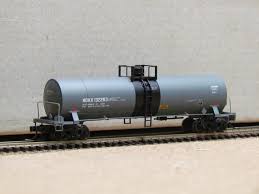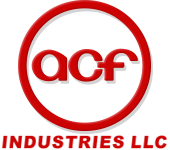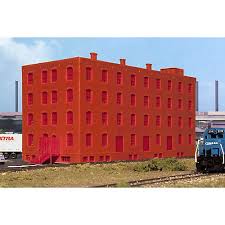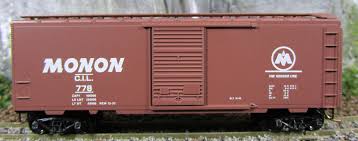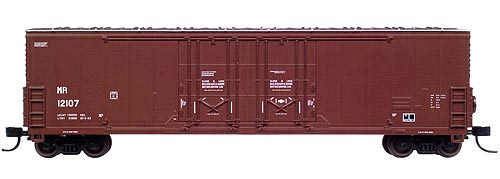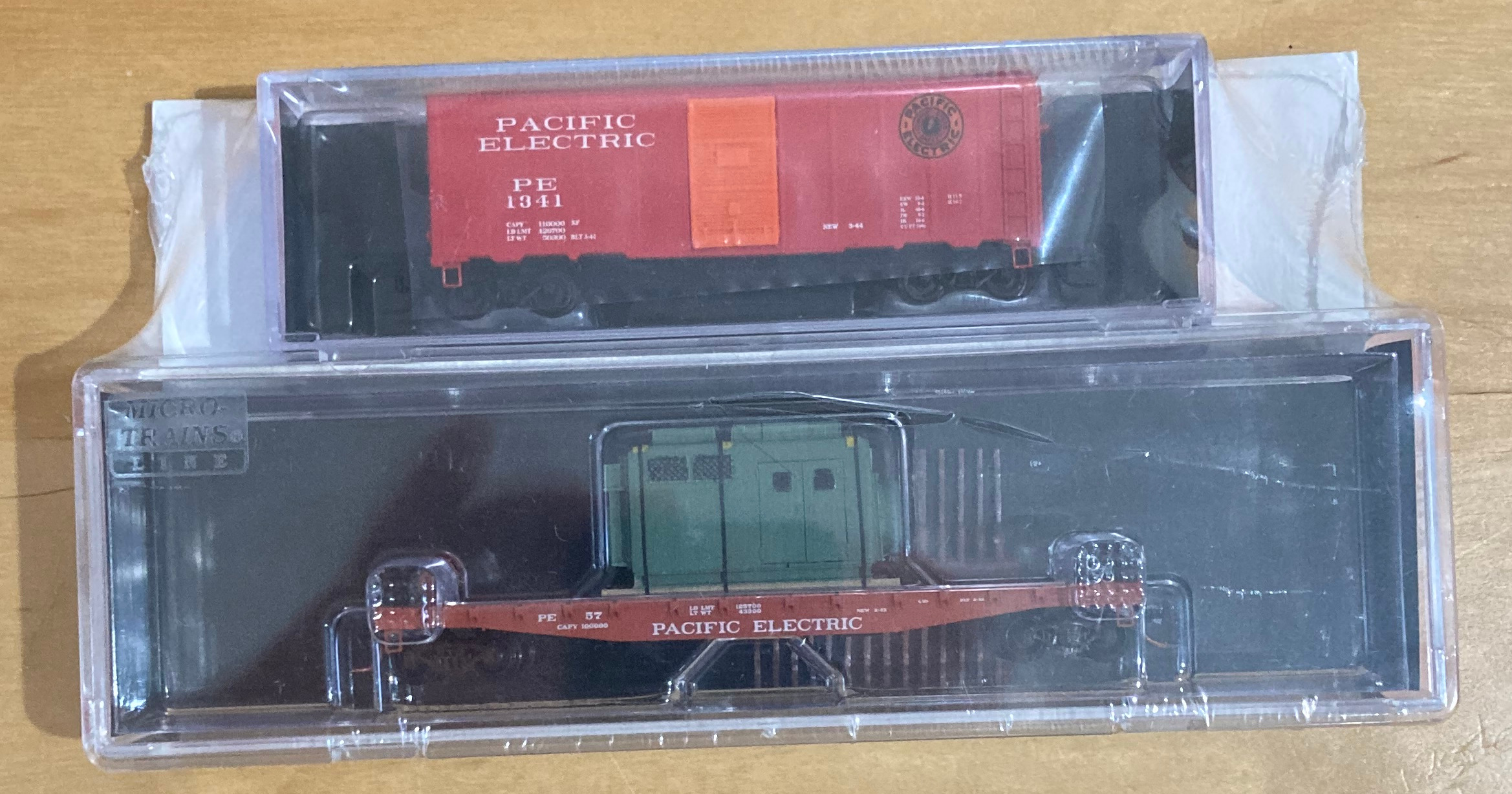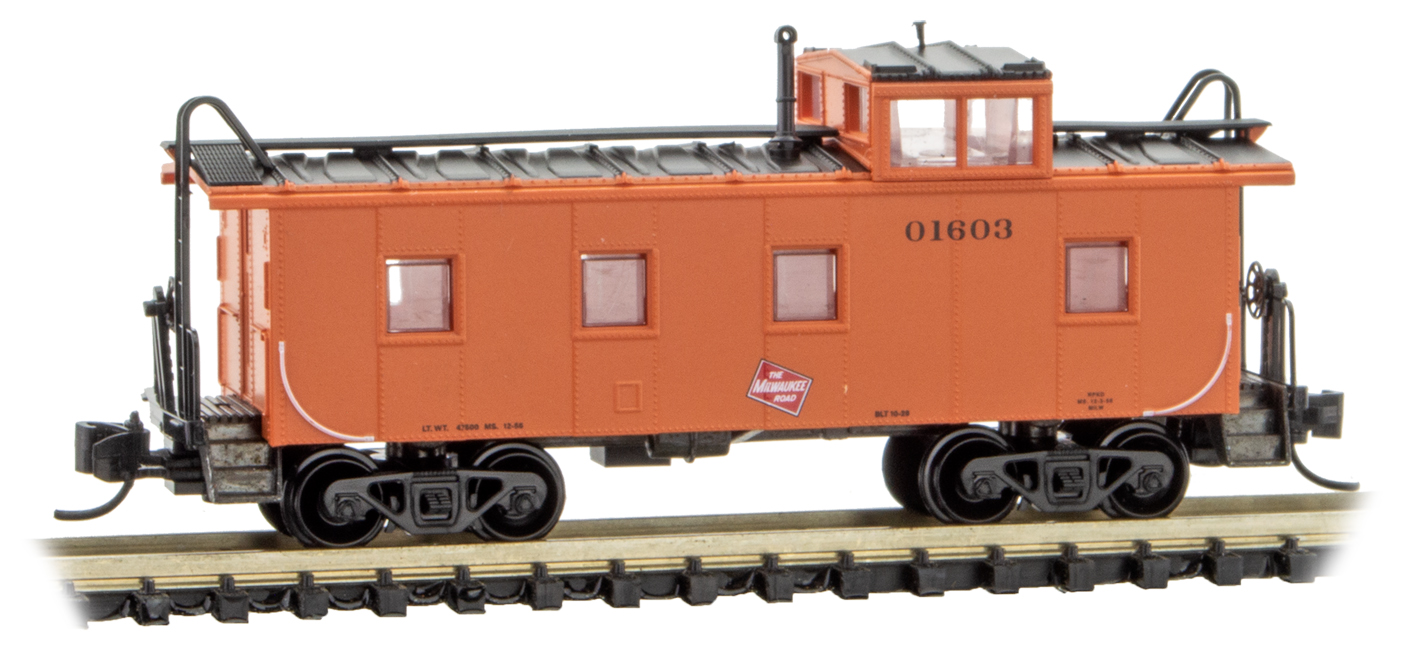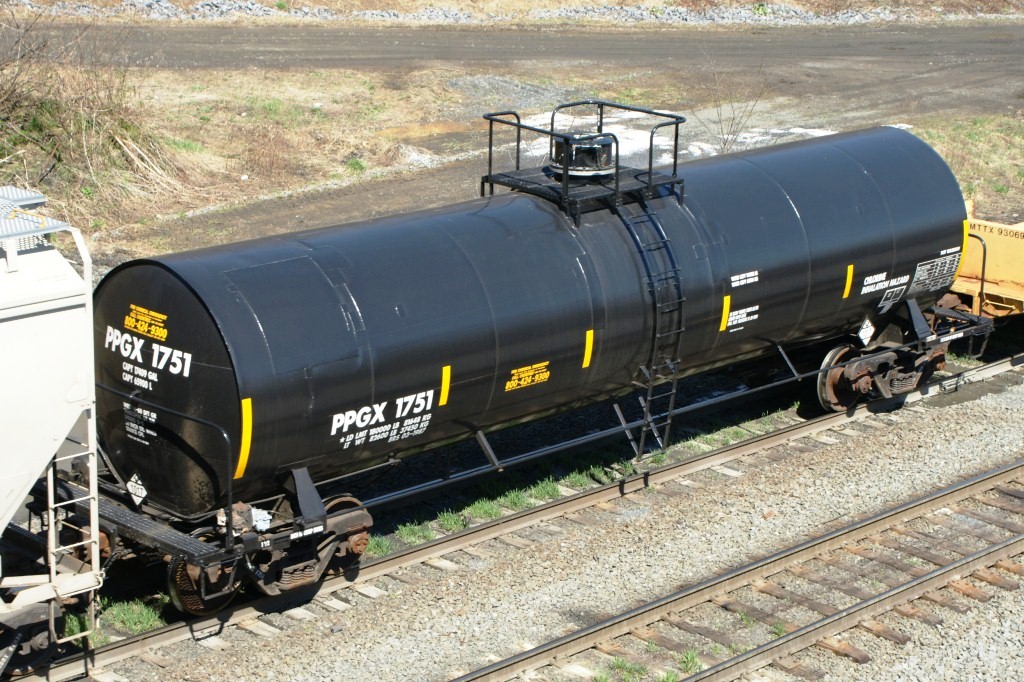Model Information: Atlas introduced this model in 2001. It features: Separately-applied brake detail, Finely molded handrails, Tank fittings, safety placards and metal safety bars, 100-ton roller-bearing trucks, Brake wheel chain detail.
Prototype History: American Car and Foundry's insulated 17,360 gallon general service tank car was designed primarily for transporting chlorine. Paper manufacturing and water/sewage treatment are two traditional consumers of chlorine in tank cars. It's used to bleach paper and to disinfect water. On the paper side, you'd see it at mills that make white papers but not the kraft stock used for making paper bags, corrugated boxes, etc. Aside from paper bleaching and water treatment (both "new" and "used" water; chlorine is added to municipal water as it enters the pipe network, and is added as a disinfectant, following sewage treatment), another common use is in the chemical and pharmaceutical industries.
These cars can also be used to transport sulfur dioxide (used for paper recycling) and chloropicrin (used to fumigate soil).
These cars can also be used to transport sulfur dioxide (used for paper recycling) and chloropicrin (used to fumigate soil).
Road Name History: 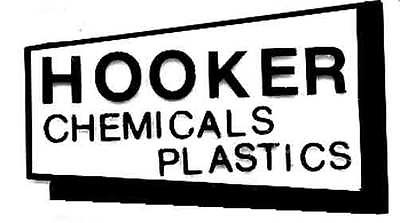 Hooker Chemical Company was an American chemical company that produced chlor-alkali products from 1903 to 1968. In 1922, Hooker bought the S. Wander & Sons company for the retail sales of lye and chlorinated lime. Hooker Chemical is best known for the chemical waste site Love Canal, which it sold in 1953, and led to a lengthy lawsuit several decades later.
Hooker Chemical Company was an American chemical company that produced chlor-alkali products from 1903 to 1968. In 1922, Hooker bought the S. Wander & Sons company for the retail sales of lye and chlorinated lime. Hooker Chemical is best known for the chemical waste site Love Canal, which it sold in 1953, and led to a lengthy lawsuit several decades later.
The company was founded in 1903 as "The Development and Funding Company" by Elon Huntington Hooker, of Rochester, NY. Hooker created a company that used the Townsend cell to elecrolyse salt into chlorine and sodium hydroxide (NaOH), also known as "caustic soda" and "lye," in a chloralkali process. Elmer Sperry, founder of Sperry Electric, and Leo Baekeland, inventor of Bakelite and Velox photographic paper consulted for Hooker to improve the design of the cell.
The company was originally sited in Niagara Falls, NY because of the low cost electricity from the Niagara Falls power project (completed in 1895), the abundance of salt from nearby mines, and availability of water from the Niagara River. However, in 1929 Hooker built a new chloralkali plant in Tacoma Washington. Hooker also owned factories in Albany, NY.
Hooker Chemical Company was purchased by Occidental Petroleum Corporation in 1968.

The company was founded in 1903 as "The Development and Funding Company" by Elon Huntington Hooker, of Rochester, NY. Hooker created a company that used the Townsend cell to elecrolyse salt into chlorine and sodium hydroxide (NaOH), also known as "caustic soda" and "lye," in a chloralkali process. Elmer Sperry, founder of Sperry Electric, and Leo Baekeland, inventor of Bakelite and Velox photographic paper consulted for Hooker to improve the design of the cell.
The company was originally sited in Niagara Falls, NY because of the low cost electricity from the Niagara Falls power project (completed in 1895), the abundance of salt from nearby mines, and availability of water from the Niagara River. However, in 1929 Hooker built a new chloralkali plant in Tacoma Washington. Hooker also owned factories in Albany, NY.
Hooker Chemical Company was purchased by Occidental Petroleum Corporation in 1968.
Brand/Importer Information: In 1924 Stephan Schaffan, Sr. founded the Atlas Tool Company in Newark, New Jersey. In 1933 his son, Stephan Schaffan, Jr., came to work for his father at the age of sixteen. Steve Jr. built model airplanes as a hobby and frequented a local hobby shop. Being an enterprising young man, he would often ask the owner if there was anything he could do to earn some extra spending money. Tired of listening to his requests, the hobby-store owner threw some model railroad track parts his way and said, "Here, see if you can improve on this".
In those days, railroad modelers had to assemble and build everything from scratch. Steve Jr. created a "switch kit" which sold so well, that the entire family worked on them in the basement at night, while doing business as usual in the machine shop during the day.
Subsequently, Steve Jr. engineered the stapling of rail to fiber track, along with inventing the first practical rail joiner and pre-assembled turnouts and flexible track. All of these products, and more, helped to popularize model railroading and assisted in the creation of a mass-market hobby. The budding entrepreneur quickly outgrew the limitations of a basement and small garage operation. Realizing they could actually make a living selling track and related products, Steve and his father had the first factory built in Hillside, New Jersey at 413 Florence Avenue in 1947. On September 30, 1949, the Atlas Tool Company was officially incorporated as a New Jersey company.
In 1985, Steve was honored posthumously for his inventions by the Model Railroad Industry Association and was inducted into the Model Railroad Industry Hall of Fame in Baltimore, Maryland. In addition, Steve was nominated and entered into the National Model Railroad Association Pioneers of Model Railroading in 1995.
In the early 1990s, the Atlas Tool Company changed its name to Atlas Model Railroad Company, Inc.
In those days, railroad modelers had to assemble and build everything from scratch. Steve Jr. created a "switch kit" which sold so well, that the entire family worked on them in the basement at night, while doing business as usual in the machine shop during the day.
Subsequently, Steve Jr. engineered the stapling of rail to fiber track, along with inventing the first practical rail joiner and pre-assembled turnouts and flexible track. All of these products, and more, helped to popularize model railroading and assisted in the creation of a mass-market hobby. The budding entrepreneur quickly outgrew the limitations of a basement and small garage operation. Realizing they could actually make a living selling track and related products, Steve and his father had the first factory built in Hillside, New Jersey at 413 Florence Avenue in 1947. On September 30, 1949, the Atlas Tool Company was officially incorporated as a New Jersey company.
In 1985, Steve was honored posthumously for his inventions by the Model Railroad Industry Association and was inducted into the Model Railroad Industry Hall of Fame in Baltimore, Maryland. In addition, Steve was nominated and entered into the National Model Railroad Association Pioneers of Model Railroading in 1995.
In the early 1990s, the Atlas Tool Company changed its name to Atlas Model Railroad Company, Inc.
Item created by: Steve German on 2016-04-13 20:04:31. Last edited by gdm on 2020-06-06 08:59:27
If you see errors or missing data in this entry, please feel free to log in and edit it. Anyone with a Gmail account can log in instantly.
If you see errors or missing data in this entry, please feel free to log in and edit it. Anyone with a Gmail account can log in instantly.


